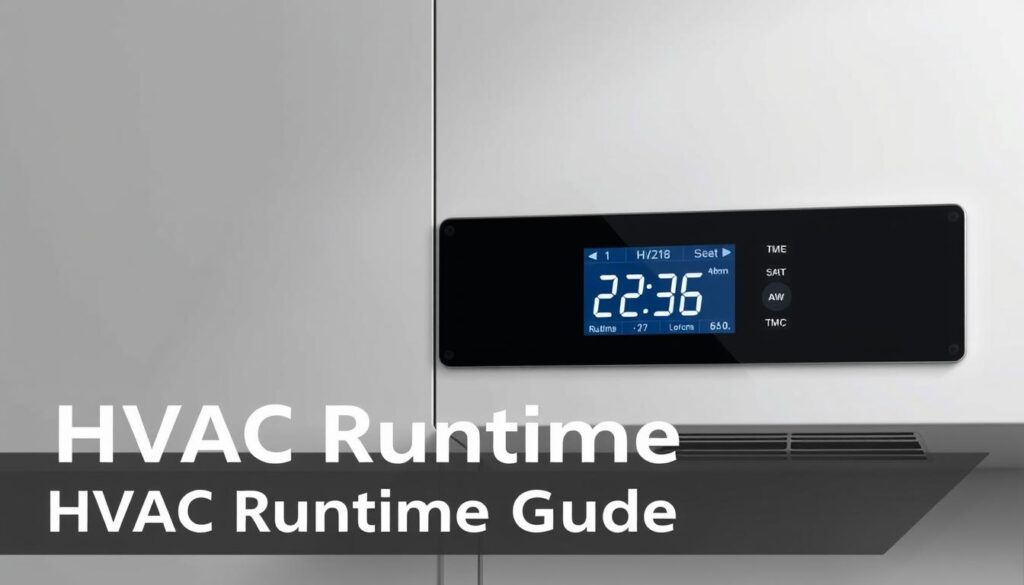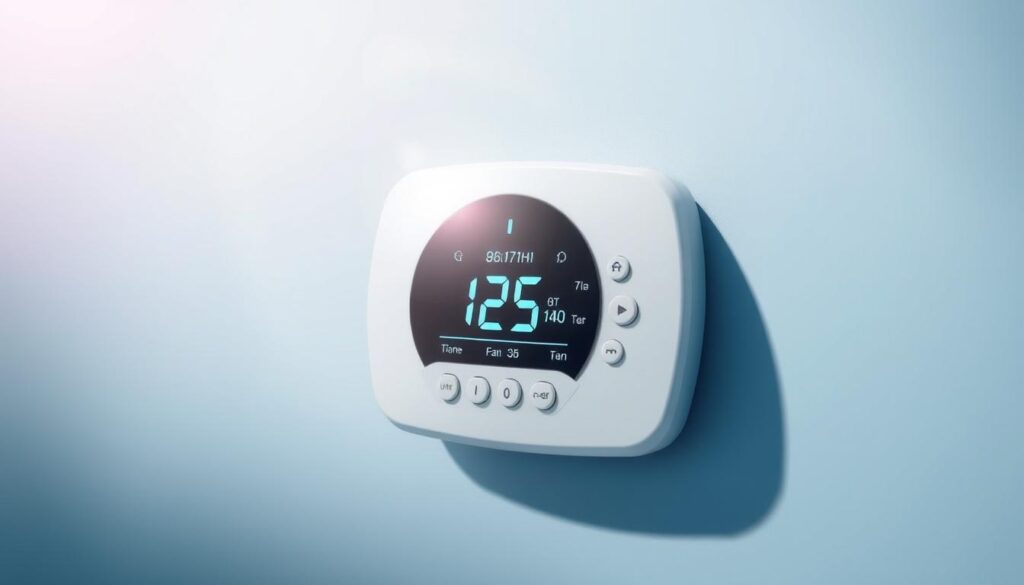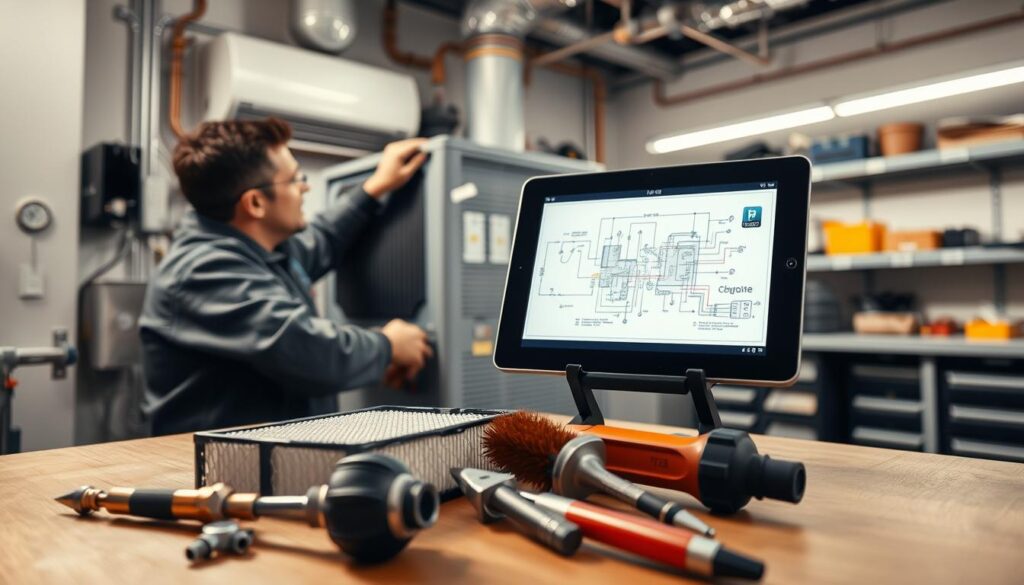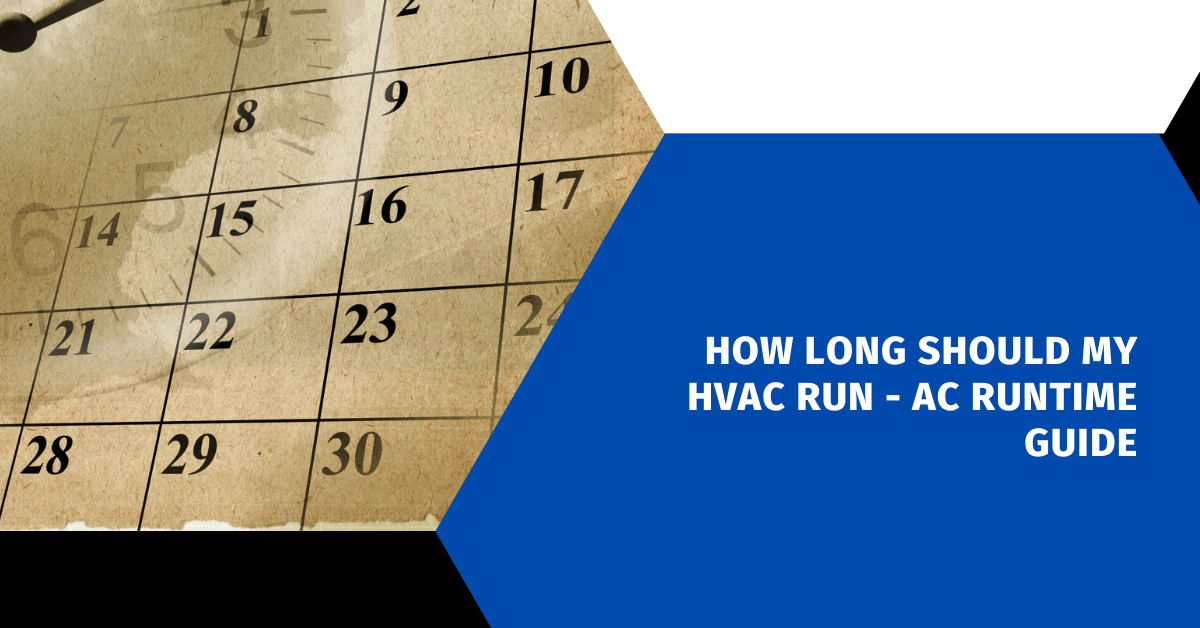Affiliate Disclosure
HVAC Guide Guys is a participant in the Amazon Services LLC Associates Program, an affiliate advertising program designed to provide a means for sites to earn advertising fees by advertising and linking to Amazon.
How Long Should My HVAC Run? Ever wondered why your air conditioner runs non-stop in summer? Knowing how long your HVAC system should run can save you money and make your home more comfortable. It’s not just about cooling—it’s about being efficient and managing energy well.

An air conditioner that’s the right size usually cycles two to three times an hour. Each cycle lasts about 15-20 minutes. How long your HVAC runs depends on several things, like the outside temperature, how well your home is insulated, and the system’s size. Knowing this can help you spot problems and keep your system running at its best.
Key Takeaways
- Normal HVAC runtime is 15-20 minutes per cycle
- Air conditioners should operate 10-15 hours daily in summer
- Cycle frequency varies based on temperature and home conditions
- Proper sizing is key for efficient HVAC operation
- Regular maintenance prevents runtime problems
Table of Contents
Understanding Optimal HVAC Runtime Cycles
Your home’s heating and cooling system runs in specific cycles. These cycles affect energy use and comfort. Knowing about these cycles helps you use your HVAC better and save energy.
The length of an HVAC cycle is very important. Air conditioners usually run for 15-20 minutes at a time. They cycle 2-3 times an hour when it’s normal.
Standard Operating Cycles
HVAC cycles change based on the environment. Here are some key facts about standard cycles:
- Normal runtime: 15-20 minutes per cycle
- Recommended cycles per hour: 2-3
- Ideal cycling frequency: About every 15 minutes
Temperature Impact on Runtime
Outdoor temperatures affect how long your AC runs. In very hot weather, ACs might run all the time to keep your home cool.
| Temperature Range | Expected Runtime | Efficiency Impact |
|---|---|---|
| Mild (70-80°F) | 15-20 minutes per cycle | High efficient hvac usage |
| Hot (85-95°F) | 20-30 minutes per cycle | Moderate efficiency |
| Extreme (95°F+) | Continuous or extended | Lower efficiency |
Cooling Cycle Duration
Short cycling can harm your HVAC system. It makes the system start and stop too much. This lowers efficiency and wears out parts faster. Keeping your HVAC cycles consistent is important for comfort and energy use.
Maintaining consistent HVAC runtime cycles is key to optimal home comfort and energy management.
Explore Our HVAC Shop
Looking for top-rated HVAC tools, parts, and accessories? Visit our shop and find the perfect solution for your needs.
Visit the ShopHow Long Should My HVAC Run in Normal Conditions
Knowing how long your HVAC should run is key for comfort and saving energy. In mild temperatures, your air conditioner should cool your home in about 15-20 minutes. This time lets it cool your home well without too much work.
Several important factors affect how long your HVAC runs. Here’s what you need to know about normal HVAC runtime:
- Ideal cycle length: 15-20 minutes in mild temperatures
- Short cycles: Less than 10 minutes indicate possible system problems
- Extended cycles: Over 20 minutes might mean the system is too small
Different conditions change how long your HVAC runs. Outdoor temperature, home insulation, and system size all matter in figuring out how long your air conditioner should run.
| Temperature Range | Expected HVAC Runtime | Potential Concerns |
|---|---|---|
| Mild (70-80°F) | 15-20 minutes | Normal operation |
| Hot (90-100°F) | 20-30 minutes | Extended but acceptable |
| Extreme (100°F+) | Continuous running | Monitor system performance |
Remember, how long your HVAC should run depends on your home’s specific needs. Regular maintenance ensures it works best and avoids running too long.
Factors Affecting AC Runtime Duration
Knowing what affects your HVAC system’s running time can help you save energy. It also improves how well your system works. Many things can change how long your AC runs under different conditions.
Your AC’s running time depends on several key factors. These factors affect its efficiency and how long it runs:
Outside Temperature and Humidity Dynamics
Severe weather can really impact your HVAC system’s performance. If it’s over 90 degrees outside, your AC might run 14 to 20 hours a day. This keeps your home cool and comfortable.
- Higher humidity makes cooling take longer
- Direct sunlight makes cooling needs even higher
- How different the indoor and outdoor temperatures are affects the system’s workload
Home Size and Layout Considerations
Your home’s size and layout are also important. Bigger homes need more energy and time to cool down.
- The size of your home affects how much cooling it needs
- Open floor plans help air circulate better
- Multi-story homes might need special cooling systems
Insulation Quality Impact
Good insulation can cut down on how long your HVAC system runs. It keeps the heat out better. This means your home stays cooler, using less energy and putting less strain on your system.
Good insulation can cut your hvac energy use by up to 30%.
Understanding these factors helps you make better choices for your HVAC system. You can optimize its performance for better efficiency.
Explore Our HVAC Shop
Looking for top-rated HVAC tools, parts, and accessories? Visit our shop and find the perfect solution for your needs.
Visit the ShopAC Performance During Peak Summer Months
In the peak summer months, keeping your home cool is key. AC systems work hard to beat the heat. Knowing how your AC performs helps use it more efficiently.
When it’s over 90°F outside, your AC might run 12 to 18 hours a day. This is vital for keeping your home cool and dry. It usually takes 15 to 20 minutes for your AC to cool your home by one degree.
- Ideal indoor humidity should remain below 50%
- AC cycles should last 50-70% of peak cooling time
- Each additional person increases cooling load by approximately 750 BTUs
To cool your home better, try these tips:
- Seal air leaks around windows and doors
- Use programmable thermostats for smart temperature management
- Maintain regular air filter replacements
Pro tip: Minimize door openings during gatherings to prevent temperature fluctuations and reduce strain on your cooling system.
Experts say to get a technician to check your system. They can make sure it’s right for your home’s cooling needs.
Signs of Inefficient HVAC Operation
Spotting problems in your HVAC system can save you money and avoid costly repairs later. Your home’s comfort and how well your HVAC works affect energy use and performance.
Knowing the signs of HVAC trouble can help you fix issues early. Inefficient operation shows in several ways:
Short Cycling Problems
Short cycling means your air conditioner turns on and off too much without cooling fully. This can be due to:
- Oversized AC units for your space
- Malfunctioning thermostats
- Blocked air filters
- Refrigerant level issues
Extended Runtime Challenges
If your HVAC system runs all the time without cooling right, it’s a sign of trouble. Prolonged hvac energy consumption can mean:
- Inadequate insulation
- Leaky ductwork
- Aging equipment
- Incorrect system sizing
Temperature Inconsistencies
Uneven cooling in your home points to HVAC problems. In Charleston’s climate, this can really affect comfort and energy use.
Watching for these signs and getting regular maintenance can improve your HVAC’s performance. It also cuts down on unexpected breakdowns.
Explore Our HVAC Shop
Looking for top-rated HVAC tools, parts, and accessories? Visit our shop and find the perfect solution for your needs.
Visit the ShopImpact of Thermostat Settings on Runtime

Your hvac thermostat settings are key to your system’s runtime and energy use. Knowing how temperature changes affect your cooling system helps you use energy wisely. This can lower your energy bills.
Choosing the right thermostat settings is important. Different temperatures can change how long your HVAC runs and how well it works.
- Recommended temperature range: 72-78°F for optimal efficiency
- Nighttime settings can be adjusted 3-5°F higher to save energy
- Smart thermostats can automate temperature management
The difference in indoor and outdoor temperatures affects your HVAC’s workload. Closer indoor and outdoor temperatures mean less energy needed. This makes your system work less hard to keep you comfortable.
| Thermostat Strategy | Energy Impact | Runtime Effect |
|---|---|---|
| Constant Temperature | More Consistent | Moderate Runtime |
| Programmed Setbacks | Potential Savings | Reduced Runtime |
| Smart Thermostat | Highest Efficiency | Optimized Runtime |
Peak power usage happens in late afternoon, making AC use less economical then. Setting your thermostat to adjust temperatures wisely can save a lot of energy. This keeps your home comfortable without breaking the bank.
Pro tip: Keeping a steady temperature is often more energy-efficient than big changes.
By managing your hvac thermostat settings well, you can find a balance between comfort and saving energy. This reduces your system’s runtime and lowers your utility bills.
Common HVAC Runtime Issues and Solutions
Knowing about HVAC problems can help you keep your system running well. Some issues can make your HVAC work less efficiently. This can lead to higher energy bills and less cooling.
Airflow Restrictions
When airflow is blocked, your HVAC has to work harder. This can make it run longer. Common causes include:
- Clogged air filters
- Blocked return vents
- Dirty ductwork
Regular upkeep can stop these problems. Experts say to change air filters every 1-3 months for better airflow and cooling.
Refrigerant Problems
Leaks in the refrigerant can really hurt your HVAC’s performance. When refrigerant levels go down, your system has to work harder. This can make it run longer and might even damage it.
- Signs of refrigerant issues include:
- Reduced cooling efficiency
- Ice formation on refrigerant lines
- Unusually long cooling cycles
System Sizing Issues
Having the wrong size HVAC can cause big problems. A unit that’s too small will run all the time. But a unit that’s too big will cycle on and off too much.
In Houston, Texas, air conditioning units may run continuously during summer months with temperatures exceeding 90 degrees Fahrenheit.
Getting a professional to check your HVAC can help. They can see if your system fits your home’s cooling needs.
Explore Our HVAC Shop
Looking for top-rated HVAC tools, parts, and accessories? Visit our shop and find the perfect solution for your needs.
Visit the ShopMaintaining Efficient HVAC Operation

To keep your HVAC system working well, you need to take care of it regularly. Small steps in maintenance can make a big difference in how much energy it uses.
Regular upkeep is key to making your HVAC last longer and work better. Homeowners can do several important things to keep it running smoothly:
- Change air filters every 1-3 months
- Clean outdoor units regularly
- Schedule professional inspections annually
- Keep vents and registers unobstructed
- Maintain consistent thermostat settings
Proper maintenance can save you a lot of money. Almost half of your home’s energy costs go to heating and cooling. So, making your HVAC system more efficient is a smart way to cut down on bills.
| Maintenance Task | Potential Savings | Frequency |
|---|---|---|
| Filter Replacement | Up to 15% energy savings | Every 1-3 months |
| Professional Tune-up | Nearly $140 annually | Yearly |
| Duct Sealing | 20-30% efficiency improvement | Every 5-7 years |
Investing in HVAC maintenance is more than just avoiding repairs. It’s about optimizing hvac energy consumption. By following these tips, you can make your system last longer, save on energy bills, and keep your home comfortable all year.
When to Call HVAC Professionals
Knowing when to call for HVAC help can prevent expensive repairs and system failures. If your HVAC runs for too long or doesn’t turn off, it’s time to call an expert. Issues with how long your HVAC runs might mean there’s a bigger problem.
Look out for warning signs that mean you need help right away. A big jump in your energy bills, your system turning on and off too much, or uneven cooling and heating are signs. Almost 90% of central air service calls are because of water leaks, showing the need for professional help.
Your HVAC system is complex and should last 15 to 20 years with care. If it’s old or keeps having problems, a pro can help. They can find leaks, thermostat issues, or size problems that affect how well it works.
Getting regular checks from pros can stop sudden breakdowns and make your system last longer. With 88% of U.S. homes using air conditioning, keeping your system running well is essential. If you notice your HVAC acting strangely or not right, call a pro.

